|  
IN THE NEWS | CALENDAR
![Shorty's boys [photo of Shorty Ames and Crabs team]](cover0801-photohed.jpg)
by GEOFF S. FEIN
THE 27 COLLEGE baseball players who make up the Humboldt Crabs come to Arcata because it's a relaxing place. The cool weather offers a nice alternative to the heat that covers most of the country in the summer. 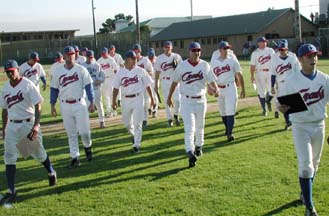 They come to the Crabs because at 58 years it's the oldest semipro baseball team in the country. They come because of the team's winning tradition (The Crabs have had an annual winning percentage of about .750 for at least 50 years, said Ned Barsuglia, 82, current scout for the Crabs.) Many players come on the advice of their college coaches. They come to the Crabs because at 58 years it's the oldest semipro baseball team in the country. They come because of the team's winning tradition (The Crabs have had an annual winning percentage of about .750 for at least 50 years, said Ned Barsuglia, 82, current scout for the Crabs.) Many players come on the advice of their college coaches.
"Their coaches know of our program, they know it's quality or they wouldn't send the kids year in and year out," said Ken "Shorty" Ames, a former minor leaguer and coach of the Crabs for the past seven years. Because most of the players hail from Division I NCAA programs, they are ready to play when they arrive in Arcata, Ames said. "You don't want to change them," he said. "You want to nurture them and help them with the mental part of the game." About a third of the team is drawn from local talent. And about the same number will be invited to return for another season, according to Ames. Every kid who comes to the Crabs gets his share of innings, Ames said. 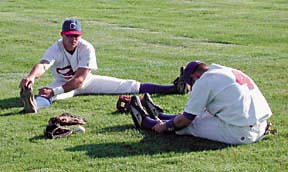 Third baseman Chad Kinyon came to the Crabs from Lima, Ohio. It was his first trip to California. He traveled farther than any of his teammates to play here. They call him "the flatlander" because there are no mountains in Ohio. The Arcata summer lacks the humidity of Ohio, and there are probably not as many people wearing dreadlocks back home in Lima. But his dad lives in Humboldt County, so the 21-year-old has family to play in front of. Third baseman Chad Kinyon came to the Crabs from Lima, Ohio. It was his first trip to California. He traveled farther than any of his teammates to play here. They call him "the flatlander" because there are no mountains in Ohio. The Arcata summer lacks the humidity of Ohio, and there are probably not as many people wearing dreadlocks back home in Lima. But his dad lives in Humboldt County, so the 21-year-old has family to play in front of.
Kinyon plays for Kent State. He has played summer baseball for the Lima Locos semipro team in the Great Lakes League but hopes to return to the Crabs next year, unless of course he is drafted by a major league team. It's every player's goal to make it to the big leagues. Ask any of the Crabs players and they'll tell you that is why they play summer baseball. "They wouldn't be competing at this level" if they didn't dream of getting to the major leagues, said catcher Brandon Marcelli. Semipro clubs are not affiliated with any major league team and the players aren't paid. Minor league teams are usually part of a major league team's farm system and the players, who range from promising prospects in their late teens to those who have had a number of years in the big leagues, are paid professionals. 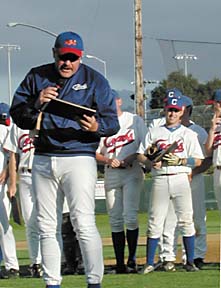 Left: Coach Ken "Shorty" Ames presents the All-American Left: Coach Ken "Shorty" Ames presents the All-American
Invitational MVP award to catcher Brandon Marcelli
Making it to the 'Show' Although it is a long way from semipro baseball to the majors, some former Crabs players have gone the distance. Dane Iorg, who was a pitcher and infielder for the Crabs in 1968, played nine seasons in the majors. Iorg made it twice to the World Series: with the St. Louis Cardinals in 1982 and the Kansas City Royals in 1985. Pitcher Dennis Springer, who won 11 games for the Crabs in 1986, threw for the Los Angeles Dodgers last year. Mike Kinkade, a member of the 1993 Crabs, played for the Baltimore Orioles last year; Mike Thurman, who was also on the 1993 team, pitched for the Montreal Expos from 1997 to 2001; and catcher Mike Redmond, a Crabs player in the early 1990s, played for the Florida Marlins in 1998. From this year's Crabs' roster, pitcher and outfielder Horace Lawrence III hopes to work out with the Philadelphia Phillies single A team next year. Pitcher and infielder Adam Carr, who just graduated from high school, was drafted by the Toronto Blue Jays in the 41st round but opted not to sign. He just left the Crabs to play in an American Legion regional tournament in Sacramento, an event watched closely by college and major league scouts alike. "It's a good place to show off his skills," Ames said. "Anytime a kid gets to go and succeed at something that's OK by me. The experience of going helps you grow." Pitcher Gregg Reynolds grew up in Arcata watching the Crabs. A student at the University of Pacific in Stockton, he has come home this summer to play baseball in front of family and friends. Donning the Crabs uniform has a special meaning for him. "It was weird putting the uniform on the first time," he said. "It's like I finally grew up." Reynolds was invited back to play for the Crabs next season, but his goal is to play ball in another part of the country. "But if that doesn't work out I'd love to come back," he said. 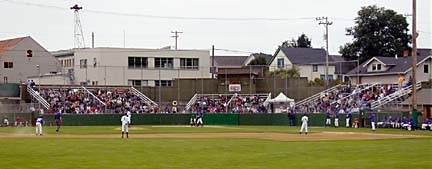
Pitcher Leo Rosales has never been away from Los Angeles for an entire summer before. A senior at California State University Northridge, Rosales said he talks to his family about once a week. Because of work and school schedules, none of his family have been able to make the almost 600-mile trip up to Arcata to see him play. Rosales found the semipros to be challenging. "That's the good thing about it, the quality teams," he said. "It makes you a better pitcher." When they leave for college, many go with new insight, maturity and a sense of community. Those perspectives come courtesy of Ames. His goal is to influence the lives of his ballplayers. Ames, who is of medium height, was nicknamed Shorty when he was two weeks old. The name stuck. "Everyone's called me that for 41 years," Ames said. Ames keeps tabs on the players during the collegiate season, which takes place in the spring. He uses the Internet to follow their statistics. He'll talk to coaches and on occasion the players will call him. Even though the Crabs season only runs from June to August, Ames has developed a special relationship with his players. "They are all my kids. All the kids that come to the park are mine," said Ames, who is married but does not have children. "I like to think I can influence the kids in a positive manner." Always the home team With the three-month season coming to a close Saturday, Kinyon, Reynolds, Rosales and the other 24 players will add their names to a long list of athletes who have played for the Crabs. The Crabs are not like any baseball team around. With the exception of the annual All-American Invitational tournament, held in different locales each year, they play all their regular season games at home. There are no deep pocket benefactors to pay for players' travel expenses or buy equipment. Even extra baseballs are hard to come by. (Foul balls are retrieved by Crabs' volunteers and then used in the Crabs Summer Youth Baseball Camp). 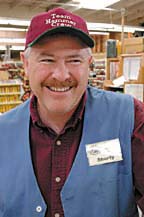 Because the players are still in college, the NCAA prevents them from earning a living playing summer ball. But the Crabs help the players find summer jobs and housing. Kinyon does maintenance work at the Quality Inn. Other players work in restaurants, at the Bayshore Mall or at any number of small businesses around Arcata and Eureka. Some live in apartments, others like Rosales stay at the Colony Inn. Because the players are still in college, the NCAA prevents them from earning a living playing summer ball. But the Crabs help the players find summer jobs and housing. Kinyon does maintenance work at the Quality Inn. Other players work in restaurants, at the Bayshore Mall or at any number of small businesses around Arcata and Eureka. Some live in apartments, others like Rosales stay at the Colony Inn.
Even Ames [photo at left] , 41, has to work during the Crabs' season. He's a manager at Pierson Building Center. But unlike his players, he doesn't return to college at the end of the season. He continues to work. Regardless, he is a happy man in the summer. "I get to be 20-years-old for (three) months out of the year," he said. The Crabs help opposing teams with travel expenses; and the team pays for the uniforms and travel expenses of the Humboldt All-Stars, a squad made up of players who didn't make the Crabs. This year the 22-member, all-volunteer board of directors that has run the team since 1995 started a new program to let Arcata families take a Crabs player out for dinner. For the players, it helps take away the feeling of being homesick, Ames said. "It gives the community a chance to treat these kids to a nice steak dinner," he said. "It's another way (for the players) to get in touch with the community." Every year the Crabs' board brainstorms on ideas to make the experience enjoyable for the players, Ames said. But what really sets the Crabs apart from the rest of the field are the fans. Although the Arcata Ball Park seats only about 500, it's more fans than many of the Crabs players see at the college level. "We are fortunate to have fans to play in front of," Kinyon said. "It's crazy. I don't know many summer ball (teams) that sell alcohol," he added, referring to the fact that beer is sold at Crabs' games. 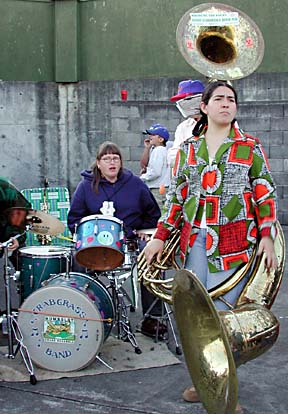 Marcelli, who attends Fresno State, said fans in the Central Valley tend to be of the fair weather variety. He estimates the Fresno State team draws only about 50 fans a game. Marcelli, who attends Fresno State, said fans in the Central Valley tend to be of the fair weather variety. He estimates the Fresno State team draws only about 50 fans a game.
"It doesn't compare to (Arcata)," where the ball park is usually packed, he said. Rosales also said he wasn't used to fans turning out for games. "(It's) nothing like compared to here," he said. "(At Northridge) they're not into it like the crowds here." Another thing that sets the Crabs apart from other semipro teams is the band: the "Crab Grass" band. The group, formed in 1983, is made up of current and former members of the Humboldt State University Marching Lumberjacks as well as die-hard Crabs fans. [photo at right shows drummer Jesica Bishop and sousaphone player Christina Velasquez.] Ames said the Crabs are all about community. He praised the support of the fans, the employers who give jobs to the players and the people who buy ads in the Crabs program. And he said the Crabs are an economic shot in the arm to the community. "We bring annually 16,000 to 20,000 people within one block from the center of town," Ames said, referring to a typical season's total attendance for the 52-game regular season. "They stay here, eat here and shop here," he said. "A legitimate amount of revenue comes into this town. I hope the business owners understand that." Ames makes sure his players also give back to the fans. "I tell the players they have to stick around and sign autographs," he said. "This might be the best level of baseball kids see. These players are heroes to the kids." Kids often come out to the games early asking to be the bat boy for a night. Seeing the smiles on kids' faces, seeing the bleachers filled with families and players seeing their own parents in the stands makes the Humboldt Crabs a perennial draw for college players from across the country, Ames said. 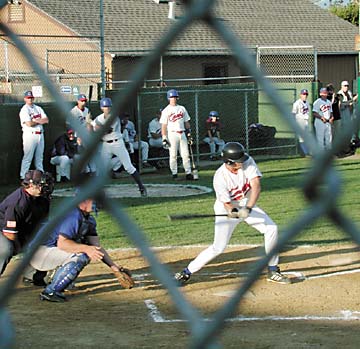
No World Series This year's team has had its share of ups and downs. In the third week of July, the team won the All-American Invitational, held this year in Gresham, Ore., a suburb of Portland. Many of the players say the Crabs came together as a team during the tournament, the first time the club has gone on the road since 1997. The team won four straight games to earn the title, including a come-from-behind victory over the Gresham Kings in the first round and a final-round 5-4 triumph over the Seattle Studs. Reynolds said the competition was very stiff. "We had our backs up against the wall, but we played our best baseball." For Ames winning the tournament was a dream come true. Ames is from Oregon and his mom and sister came out to watch the Crabs play. "My mom is still (my) biggest fan," he said. "She spent a lot of years in the bleachers watching her little boy. That's important to me." The victory earned the Crabs $6,000. It also gave them a berth at the National Baseball Congress World Series in Wichita, Kan., the most prestigious tournament for semipro teams. The tournament, in which 48 squads vie for the top prize, also draws scouts from major league teams. But scheduling conflicts and the $30,000 cost to send the team to Wichita led the board to make a painful decision. It voted not to send the team. "It was a heart-wrenching decision," said Carl Pellatz, president of the Crabs board and the team's beer concession man. 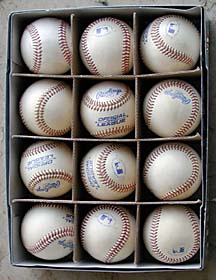 In order to have gone to the tournament, which began on Sunday and runs to Aug. 11, the Crabs would have had to cancel the last four games of the season, breaking contracts with teams and disappointing season ticket holders. The team also would have had to cancel the final session of its youth baseball camp, a week-long intensive held throughout the summer that costs $70 per kid. Additionally, team officials are under a bit of financial pressure at the moment -- they're trying to raise $47,000 to match a $325,000 city grant for much needed repairs and upgrades to the venerable ballpark, which has been built piecemeal since the 1870s. In order to have gone to the tournament, which began on Sunday and runs to Aug. 11, the Crabs would have had to cancel the last four games of the season, breaking contracts with teams and disappointing season ticket holders. The team also would have had to cancel the final session of its youth baseball camp, a week-long intensive held throughout the summer that costs $70 per kid. Additionally, team officials are under a bit of financial pressure at the moment -- they're trying to raise $47,000 to match a $325,000 city grant for much needed repairs and upgrades to the venerable ballpark, which has been built piecemeal since the 1870s.
"We did call to see if the [opening] game [of the tournament] could be rescheduled," Pellatz said. "It's a definite blow that they won't be able to go." Making the decision even tougher was the fact that the Crabs haven't been to the World Series since 1985. Back then transportation to Wichita and hotel rooms for the players and coaching staff was affordable, said Barsuglia. He said the team played games along the way to Wichita to help offset the costs. Barsuglia has been with the Crabs for more than 50 years. In addition to his current job as scout, he has served as board member, president and general manager. He recalls when teams could go to Wichita for less than $15,000. This year it was expected to cost the team just $18,000 for plane tickets and hotel rooms. On top of everything else, the first place prize money is only $15,000. "It's a prestige to go back there, but why go in the hole?" Barsuglia said. "For $15,000, it's not worth it."
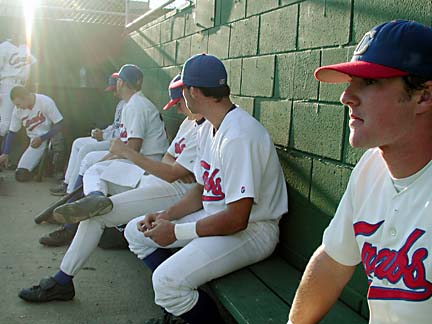 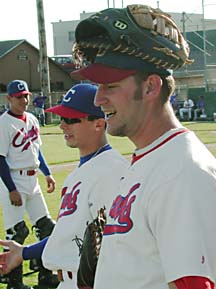
Left: Dan Evans, seated closest, keeps an eye on the action during the Crabs game against the Humboldt All-Stars. Right: Nick Giacone hams it up before a Crabs game.
Some of the players see it differently, particularly those who were looking forward to the chance to impress a major league scout. Kinyon, along with many of his teammates, questioned why the Crabs board sent the team to the All-American Invitational if they knew the team wouldn't be able to go to Kansas. Marcelli was even more blunt. "It was pretty rough," he said "(I) had a hard time swallowing the story they gave us." Ames said the team knew if it won the invitational it would get a spot in the World Series. "We thought we'd cross that bridge when we got to it," he said. "Maybe (Gresham) was our Wichita." Had the Crabs gone to Kansas, Ames may not have been able to go because of his job with Pierson's. Disappointment is not only part of the game, it's part of life. That is the message Ames tries to install in the players. "Life's not fair all the time," he said. "Baseball is a game; life is an experience." One example of Ames' positive influence was demonstrated at the All-American Invitational. He said Seattle players yelled at the umpires and were not very good sports. "I [told the] kids to be a class act. It doesn't do any good to be a jerk," Ames said. "Hopefully they can take that home with them and pass it along to another kid." Happy with the Crabs 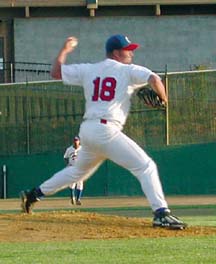 Ames has been with the Crabs for 11 years, the first four years as assistant coach. After that long a time, some coaches in semipro baseball might consider moving on or retiring, but apparently not Ames. He just signed his first two-year contract. Ames has been with the Crabs for 11 years, the first four years as assistant coach. After that long a time, some coaches in semipro baseball might consider moving on or retiring, but apparently not Ames. He just signed his first two-year contract.
Coaching the Crabs takes about three months out of the year, Ames said. And at the end of each season, Ames and his wife of 15 years, Leslie, sit down and evaluate the past season. "It's something we look at every year," he said. But Ames still feels he has a debt to pay to baseball. "There was someone there for me when I was their age," he said. "I feel obligated to give the experience back." For a time, Ames lived out almost every kid's dream. Within a few days after graduating from high school in Oregon, Ames was playing in the minor leagues for the Atlanta Braves organization. He spent almost five years in Tennessee and Georgia, hoping to make it as a pitcher. He even roomed with outfielder Brett Butler, an all-star who played with the Atlanta Braves, San Francisco Giants and Los Angeles Dodgers. Although a shoulder injury ended his career, Ames said he wouldn't trade the memories for a "bag of gold." The experience lets Ames not only help his players develop their on-field skills, but also their off-field attitudes. Ames tells his players they need to get their college degrees and they need to be active not only in Arcata but in their own communities. "On the field baseball has to be No.1. But it's a different life off the field," he said. "If a kid has success in baseball it doesn't mean `jack' if he's not successful in life." [Above left photo: Donnie Bair winding up to throw another strike]
IN THE NEWS | CALENDAR Comments? E-mail the Journal: [email protected] 
© Copyright 2002, North Coast Journal, Inc. |